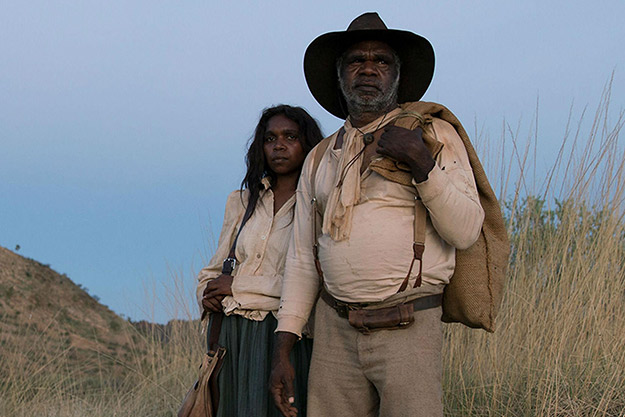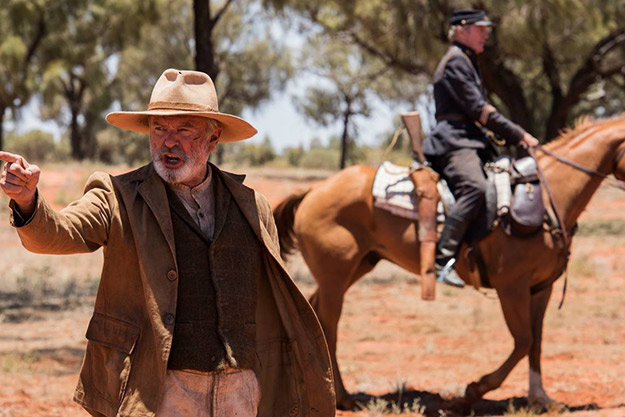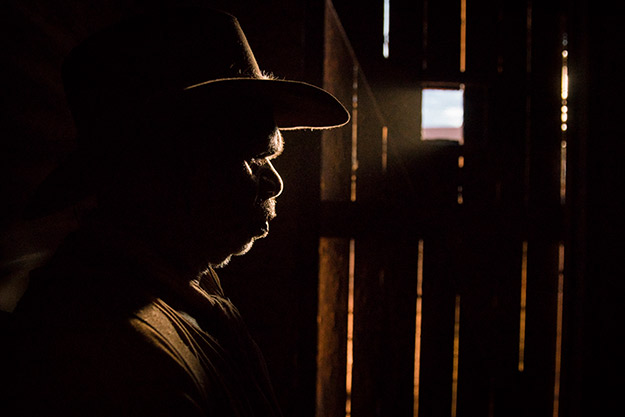Film of the Week: Sweet Country

Warwick Thornton’s Australian period drama Sweet Country ends with a character asking the rhetorical question, “What chance has the country got?” before the film closes on the image of an Aboriginal teenage boy. Viewers will know the answer already if they have seen Thornton’s Samson and Delilah (2009), a bleak but not hopeless drama which tells us what future lies ahead for that boy’s successors, the young Aborigines of present-day Australia: their chance of flourishing will be hard won.
It takes some adjusting of perception to realize that Sweet Country is set in the 1920s; there’s a reference to one character having fought in World War I, and a silent film screening at least locates it in the 20th century. But given the look of the film, set in the expanses of Australia’s Northern Territory, we could just as well be in the 1820s, and in the American West. Sweet Country is the latest non-American to borrow the language and iconography of the Western—including its use of landscapes and distant riders within them, not to mention a saloon that could be in Dodge City, if it weren’t built of rusty corrugated iron.
Above all, Sweet Country is about a society built on racism and violent oppression—a story that carries echoes, on one hand, of the fate of Native Americans and, on the other, of American slavery. But this story is about the Aborigines and their treatment by white Australians. While it’s essentially an ensemble piece, its central character is Sam Kelly (Hamilton Morris), an Aboriginal man who—a flash-forward at the outset tells us—will find himself chained, on trial for murder. We also know that there will be other violence ahead: a brief, startling shot of a minor character with a blood-spattered face isn’t explained till the very end, but puts us on our guard. While Thornton and editor Nick Meyers repeatedly fragment their narrative with abrupt flashes forward and back, there’s deception at stake in their strategy. Instead, they use these inserts to lay their cards on the table about what’s going to happen to various characters sooner or later. In other words, chance doesn’t have much to do with it; fate is all.
The film starts with an ominous, enigmatic touch: a close-up of boiling water in a pan, into which a hand throws what could be coffee and sugar but looks more like earth and salt. These are elements from the “sweet country” itself, primed to boil over, as signaled by sounds of shouting and fighting in the background. Then comes a slow build-up, introducing different characters in different locations. On one farm, or “station,” lives a peaceful, religious-minded farmer, Fred Smith (Sam Neill), along with his farmhand Sam and Sam’s wife Lizzie (Natassia Gorey-Furber). One day another white farmer, Harry March (Ewen Leslie), arrives and introduces himself; he needs help on his station nearby. He refers to Aboriginals as “blackstock”—like disposable chattels. Smith calmly replies that on his farm, “We’re all equal . . . in the eyes of the Lord.” March contemptuously points out that he fought on the Western Front, where there wasn’t much sign of the Lord—and the film cuts away to March alone, raging by firelight. He’s a man of the gun and of the bottle, traumatized by war—although that experience only sharpens, rather than causes, his bitter contempt for the Aboriginals.

The second location is another station, where farmer Mick Kennedy (Thomas M. Wright) lives alongside two elderly Aboriginal workers and Philomac (played by twins Tremayne and Trevon Doolan), the adolescent mentioned above, whose defiant sangfroid and independence of spirit seem to make him largely immune to his mistreatment by Kennedy.
Written by David Tranter and Steven McGregor, the story is built on an exchange of places, and of people. While the benign Smith believes in equality between “blackfella” and “whitefella,” as they’re termed here, he’s still happy to donate Sam’s services to March. Sam, Lizzie, and their niece Lucy head to March’s station, where Sam helps erect an enclosure, to scant thanks from the boorish farmer. While they’re there, March commits a horrific act, staged and shot by Thornton all the more powerfully dramatic because of the tact with which it’s shown. In a long, slow take, March closes the house’s doors and shutters until only vertical slashes of light remain on the inside. The ensuing act of violence takes place in total darkness, ensuring dignity for its victim.
What leads the drama to its critical point, however, isn’t this act, but a different one. Philomac and old Aboriginal hand Archie (Gibson John) are in turn sent by Kennedy to work for March—who chains the boy to a rock on suspicion of stealing his watch. Philomac coolly frees himself and leaves; March heads in pursuit. But before long, as a direct result, it’s Sam and Lucy who are on the run, walking across the outback with the law on their tail.
That pursuit takes the film in an unexpected direction, not least because it brings a new character to the fore—Sergeant Fletcher (Bryan Brown), a lawman who presides with clenched jaw and sour taciturnity over the nearby town. Fletcher heads up the posse to track down Sam and Lucy—which Smith insists on joining because, he says, he wants to see Sam return alive.

Not everyone comes back in one piece: the landscape is fraught with peril, for fugitives and pursuers. One source of danger is a tribe of Aboriginals aggressively defending their territory against these interlopers; Sam, Lucy, and the other indigenous, English-speaking farm workers are figures caught between two worlds, seen as absolute others by the whites, but also regarded as alien by the land dwellers. Philomac, we later discover, occupies his own intermediate position as he is mixed race.
The journey becomes an ordeal for Fletcher in particular, who decides at one point to go it alone into unknown territory. We seem suddenly to shift into another movie entirely as Fletcher is seen from afar, crossing vast salt flats under a shimmering sun; when we then see him up close from above, crawling desperate across the white ground, the film seems to have become the account of his quasi-Biblical passion in the desert. The religious theme is introduced by the devout Smith, but by the end, another character becomes a sacrificial martyr figure. That “what chance?” payoff, accompanied by the image of a rainbow, leaves us hesitating between possible meanings: a token of providential renewal, or something closer to “why hast Thou forsaken me?”
Sweet Country plays with history and time to troubling effect. In its hallucinatory set of dissolves showing Fletcher on horseback crossing the flats, jacket covering his head so that his silhouette looks decapitated, there seems to be an allusion to Sidney Nolan’s famous paintings of the outlaw Ned Kelly. Sure enough, later in town—in the very spot outdoors where Sam’s trial will take place—a traveling cinema show is screening the 1906 silent The Story of the Kelly Gang. There’s something at work here which is hard to pin down—bearing in mind that Sam’s surname is also Kelly. It’s almost as if, in the course of the chase, Sam and Fletcher have changed places. The policeman now looks more like an outlaw, or at least a desperate individual estranged from the legal order he supposedly represents; certainly, Fletcher shows nothing but contempt for the mild-mannered city judge (Matt Day) who arrives to try Sam’s case.

Fletcher’s move to center stage for the film is perplexing. We know little about him, except that he’s as brutal and racist in his own way as March, and that he nurses a possessive desire for Nell (Anni Finsterer), who presides over the town bar; he eventually proposes she leave to set up a farm with him (“Some sweet country out there”). But Fletcher never really attains consistency as a character, and it’s odd that so much of the film rests on his shoulders, when the story has other intriguingly ambivalent white males to examine: Kennedy, who becomes a gentler, more doubt-filled figure than we expect, and the decent but compromised and ineffectual Smith. There are a lot of subtexts to cram in—not least the relationship between Philomac and Archie, who sees the boy as another oppressor in the making, estranged from his roots and from the country long ago stolen by Kennedy and his kind.
It might have been simpler had Thornton made a more single-minded film based on the hunt, concentrating on the parallel between the two male fugitives, Sam and Philomac. As it is, Sweet Country can seem diffuse, or to have lost its way—although it’s in the nature of a pursuit movie that people veer off the straight path, and that time will expand and contract with bewildering plasticity (look at the time scheme of The Searchers, an inescapable comparison).
Nevertheless, it’s Sam Kelly who remains unmistakably at the center of the drama, whether literally placed center screen in the trial sequences, or taking the privileged vantage point in the outback scenes in which, placed overhead on a bluff, he is the only character who sees the whole action unfold. Hamilton Morris’s air of contemplative patience makes him a magnetic figure, while the distinctive rhythms and inflections of Aboriginal English-speaking style are one of the mesmerizing features of the film. Another is Thornton’s own cinematography, which allows us glimpses of poetic beauty between stretches of commanding austerity, as the country imposes itself with a majesty and mystery that seem utterly alien to the human order: as in an extraordinary shot of a skyline through fine strands of waving grass. In a milieu where, the dialogue repeatedly suggests, madness has become the defining condition of the white colonizer, the dispassionate unforgiving beauty of these landscapes—of a country that’s often far from sweet—comes to embody its own bleak sanity.
Jonathan Romney is a contributing editor to Film Comment and writes its Film of the Week column. He is a member of the London Film Critics Circle.







